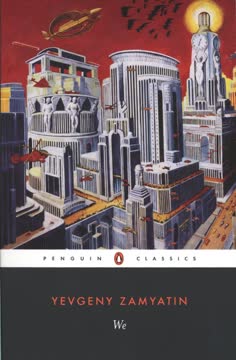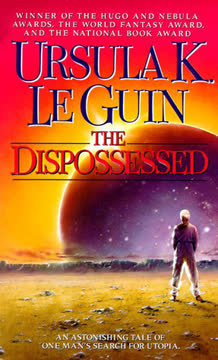Plot Summary
The One State's Proclamation
D-503, the chief engineer of the Integral, is tasked with spreading the One State's ideology to other planets. The One State is a totalitarian regime where citizens, known as Numbers, live under strict surveillance and control. D-503 is proud of his role and believes in the mathematical perfection of the One State, which promises happiness through absolute order and logic. However, his encounter with I-330, a rebellious woman, begins to challenge his beliefs.
Spring's Disruptive Influence
As spring arrives, D-503 is disturbed by the natural world beyond the Green Wall, which separates the One State from the untamed wilderness. The beauty and disorder of nature contrast sharply with the sterile, controlled environment of the One State. D-503's interactions with I-330 further disrupt his logical mindset, as she introduces him to emotions and desires that conflict with the One State's ideals.
The Green Wall's Secrets
D-503's fascination with I-330 leads him to the Ancient House, a relic of the past, where he learns about the world beyond the Green Wall. This forbidden knowledge ignites a sense of individuality and rebellion within him. He becomes increasingly torn between his loyalty to the One State and his growing desire for freedom and self-discovery.
The Great Operation
The One State announces the Great Operation, a procedure to remove imagination and ensure complete conformity among citizens. D-503 is initially supportive, seeing it as a way to eliminate the chaos within him. However, as he becomes more involved with I-330 and the resistance movement, he begins to question the morality of the operation and the true cost of the One State's version of happiness.
The Rebellion's Spark
The resistance, led by I-330, plans to hijack the Integral and use it to spread their message of freedom. D-503 is caught between his duty to the One State and his love for I-330. The rebellion's actions lead to chaos and violence, challenging the One State's control and forcing D-503 to confront his own beliefs and desires.
The Integral's Destiny
As the day of the Integral's launch approaches, D-503 is torn between his loyalty to the One State and his feelings for I-330. The rebellion's plan to seize the Integral is thwarted, and D-503 is captured. He is forced to undergo the Great Operation, which removes his imagination and individuality, leaving him a compliant citizen once more.
The Final Confrontation
After the operation, D-503 is a shell of his former self, devoid of the emotions and desires that once drove him. The One State regains control, but the seeds of rebellion have been planted. The story ends with a sense of ambiguity, as the struggle between freedom and control continues, leaving the future of the One State uncertain.
Characters
D-503
D-503 is the chief engineer of the Integral and a loyal citizen of the One State. His encounters with I-330 awaken emotions and desires that challenge his belief in the One State's ideals. Throughout the story, he struggles with his identity and the conflict between logic and emotion, ultimately undergoing the Great Operation, which strips him of his individuality.
I-330
I-330 is a charismatic and rebellious woman who challenges the One State's authority. She seduces D-503 and introduces him to the resistance movement. Her actions and beliefs inspire D-503 to question the One State's control, but her ultimate fate is left ambiguous as the rebellion is crushed.
O-90
O-90 is a gentle and loving woman who is assigned to D-503 as a sexual partner. She represents the compliant and content citizen of the One State. Her desire for a child and her love for D-503 lead her to make difficult choices, ultimately seeking freedom beyond the Green Wall.
S-4711
S-4711 is a Guardian, responsible for maintaining order and surveillance in the One State. He represents the oppressive control of the regime and is a constant presence in D-503's life, monitoring his actions and ensuring compliance with the One State's rules.
The Benefactor
The Benefactor is the leader of the One State, embodying its ideals of logic and control. He oversees the Great Operation and the suppression of the rebellion. His presence looms over the story as the ultimate authority, enforcing conformity and punishing dissent.
Plot Devices
The Green Wall
The Green Wall separates the One State from the natural world, symbolizing the divide between order and chaos. It represents the One State's attempt to control and isolate its citizens from the unpredictable and untamed aspects of life. The Wall's breach by the resistance signifies the potential for change and the challenge to the One State's authority.
The Integral
The Integral is a spaceship designed to spread the One State's ideology to other planets. It represents the One State's ambition to extend its control beyond Earth. The rebellion's plan to seize the Integral highlights the conflict between freedom and control, as it becomes a tool for both oppression and liberation.
The Great Operation
The Great Operation is a medical procedure designed to remove imagination and ensure conformity among citizens. It symbolizes the One State's ultimate control over its people, stripping them of their individuality and emotions. D-503's experience with the operation underscores the story's exploration of the cost of conformity and the loss of self.
Analysis
"We" is a dystopian novel that examines the tension between individual freedom and state control. Through the protagonist D-503's journey, the story explores the consequences of a society that prioritizes order and logic over human emotion and individuality. The novel raises questions about the nature of happiness, the role of imagination, and the value of rebellion. Zamyatin's work serves as a cautionary tale about the dangers of totalitarianism and the importance of preserving the human spirit in the face of oppressive regimes.
Last updated:
FAQ
Synopsis & Basic Details
What is We about?
- Dystopian society under control: We depicts a future society, the One State, where individuals are known as "Numbers" and live under strict, mathematically-precise control, believing it leads to ultimate happiness.
- Individual vs. collective conflict: The story follows D-503, a builder of the spaceship Integral, as he grapples with emerging emotions and desires that challenge the One State's rigid logic and his own identity.
- Rebellion and self-discovery: D-503's journey involves a forbidden love, a growing awareness of the world beyond the One State, and a struggle against the suppression of individuality, leading to a rebellion against the system.
Why should I read We?
- Pioneering dystopian vision: We is a foundational work of dystopian literature, offering a chilling and thought-provoking exploration of totalitarian control and its impact on human nature.
- Exploration of complex themes: The novel delves into profound themes such as the conflict between reason and emotion, the nature of freedom and happiness, and the dangers of unchecked power.
- Unique narrative style: Zamyatin's use of a diary format, combined with his sharp, satirical prose, creates a compelling and immersive reading experience, offering a unique perspective on a society obsessed with order.
What is the background of We?
- Post-revolutionary Russia context: Written in the early 1920s, We reflects the anxieties and disillusionment of post-revolutionary Russia, where the promise of a utopian society was giving way to totalitarian control.
- Technological and social control: The novel explores the potential dangers of technology and social engineering, depicting a society where every aspect of life is regulated and monitored by the state.
- Influence of scientific rationalism: The One State's emphasis on mathematical precision and scientific logic reflects the growing influence of rationalism and its potential to dehumanize society when taken to extremes.
What are the most memorable quotes in We?
- "There is no final revolution.": This quote encapsulates the core theme of the novel, highlighting the cyclical nature of change and the impossibility of achieving a static, perfect society.
- "The only means of ridding man of crime is ridding him of freedom.": This chilling statement reveals the One State's belief that absolute control is necessary for maintaining order, even at the cost of individual liberty.
- "What is it to you if I stay here—alone? What is it to you if I don't want others to want for me, if I want to want myself—if I want the impossible....": This quote captures the essence of the rebellion, emphasizing the importance of individual desire and the pursuit of the impossible, even in the face of overwhelming odds.
What writing style, narrative choices, and literary techniques does Yevgeny Zamyatin use?
- Diary format for intimacy: Zamyatin employs a diary format, allowing readers direct access to D-503's thoughts and feelings, creating a sense of intimacy and immediacy as he grapples with his changing worldview.
- Satirical and ironic tone: The novel uses satire and irony to critique the One State's ideology, exposing the absurdity and dehumanization inherent in its pursuit of absolute control and mathematical perfection.
- Symbolism and recurring motifs: Zamyatin uses recurring symbols and motifs, such as the Green Wall, the Integral, and the color yellow, to reinforce the novel's themes and create a rich, layered reading experience.
Hidden Details & Subtle Connections
What are some minor details that add significant meaning?
- The "pink coupon" system: The seemingly mundane system of pink coupons for sexual encounters reveals the One State's attempt to control even the most intimate aspects of human life, reducing love to a regulated function.
- The old woman's mouth: The old woman at the Ancient House, with her "ingrown" mouth, symbolizes the suppressed past and the distortion of human expression under the One State's control.
- The recurring "X" motif: The recurring "X" motif, often associated with I-330, represents the unknown, the irrational, and the disruptive forces that challenge the One State's rigid order.
What are some subtle foreshadowing and callbacks?
- D-503's dream of sap: D-503's early dream of sap flowing from a Buddha statue foreshadows his awakening to the irrational and emotional aspects of life, which are suppressed by the One State.
- The "It's clear" phrase: D-503's repeated use of the phrase "It's clear" highlights his initial reliance on logic and reason, which is gradually undermined as he experiences the complexities of human emotion.
- The lilies of the valley: O-90's gift of lilies of the valley, initially dismissed by D-503, becomes a symbol of the natural world and the emotional connections that the One State seeks to eradicate.
What are some unexpected character connections?
- The doctor and I-330: The doctor's connection to I-330, revealed through the "liqueur" and the medical certificates, suggests a hidden network of resistance within the One State's seemingly monolithic structure.
- R-13 and I-330: The subtle connection between R-13 and I-330, hinted at through their shared ideas and R-13's sudden change in demeanor, reveals a deeper level of resistance and a challenge to the One State's control over thought.
- S-4711 and the Guardians: S-4711's role as a Guardian, yet his apparent sympathy for D-503, suggests a potential for dissent even within the One State's enforcers, blurring the lines between loyalty and rebellion.
Who are the most significant supporting characters?
- R-13, the poet: R-13, the poet, represents the creative spirit and the power of language, which the One State attempts to control and manipulate for its own purposes.
- The old woman: The old woman at the Ancient House serves as a link to the past and a reminder of the human experiences that the One State seeks to erase.
- U, the controller: U, the controller, embodies the One State's bureaucratic and controlling nature, highlighting the insidious ways in which the regime seeks to regulate every aspect of its citizens' lives.
Psychological, Emotional, & Relational Analysis
What are some unspoken motivations of the characters?
- D-503's desire for connection: Beneath his initial adherence to the One State's logic, D-503 yearns for genuine human connection, which is ultimately fulfilled through his relationship with I-330.
- I-330's need for change: I-330's rebellious actions are driven by a deep-seated need for change and a rejection of the One State's oppressive control, as well as a desire to experience life fully.
- O-90's longing for motherhood: O-90's desire for a child represents a fundamental human longing for connection and creation, which is suppressed by the One State's rigid control over reproduction.
What psychological complexities do the characters exhibit?
- D-503's internal conflict: D-503's internal struggle between his logical programming and his emerging emotions reveals the psychological toll of living under a totalitarian regime.
- I-330's calculated manipulation: I-330's calculated manipulation of D-503, while serving her rebellious goals, also reveals a complex and perhaps vulnerable side to her character.
- O-90's naive acceptance: O-90's naive acceptance of the One State's rules, while seemingly simple, also reveals a deep-seated desire for love and connection, even within the confines of the system.
What are the major emotional turning points?
- D-503's first encounter with I-330: D-503's first encounter with I-330 marks a turning point, as it awakens emotions and desires that challenge his belief in the One State's ideals.
- D-503's visit to the Ancient House: D-503's visit to the Ancient House exposes him to the past and the world beyond the Green Wall, further fueling his internal conflict and his desire for freedom.
- D-503's betrayal of O-90: D-503's betrayal of O-90, driven by his obsession with I-330, highlights the destructive power of his newfound emotions and his struggle to reconcile them with his former self.
How do relationship dynamics evolve?
- D-503 and I-330's power dynamic: The relationship between D-503 and I-330 evolves from one of seduction and manipulation to one of shared rebellion and a complex, often painful, connection.
- D-503 and O-90's contrasting love: The contrasting relationships between D-503 and O-90, and D-503 and I-330, highlight the different forms of love and connection that exist within and outside the One State's control.
- D-503 and R-13's friendship: The breakdown of D-503's friendship with R-13, due to their differing views on the One State and their shared connection to I-330, reveals the destructive impact of the regime on personal relationships.
Interpretation & Debate
Which parts of the story remain ambiguous or open-ended?
- The fate of I-330: The ultimate fate of I-330 is left ambiguous, leaving the reader to wonder whether she escaped the One State or was captured and punished.
- The success of the rebellion: The success of the rebellion is also left open-ended, with the One State regaining control but the seeds of dissent still present, suggesting a potential for future uprisings.
- The nature of the "soul": The nature of the "soul" and its relationship to imagination and individuality remains ambiguous, prompting readers to consider the true meaning of human consciousness.
What are some debatable, controversial scenes or moments in We?
- D-503's actions towards O-90: D-503's treatment of O-90, particularly his use of her to obtain a pink coupon and his subsequent rejection of her, raises questions about his morality and the extent of his transformation.
- The Benefactor's justification of cruelty: The Benefactor's justification of cruelty as a necessary means to achieve happiness is a controversial moment, forcing readers to confront the ethical implications of totalitarian control.
- The ending and D-503's lobotomy: The ending, with D-503's lobotomy and his return to a state of conformity, is a controversial moment, prompting debate about the nature of free will and the possibility of resistance.
We Ending Explained: How It Ends & What It Means
- D-503's forced conformity: The ending sees D-503 undergoing the Great Operation, which removes his imagination and individuality, leaving him a compliant citizen of the One State.
- Suppression of rebellion: The rebellion is ultimately crushed, with many of its leaders captured and punished, highlighting the One State's ability to maintain control through force and manipulation.
- Ambiguous future: The ending leaves the future of the One State ambiguous, with the seeds of rebellion still present, suggesting that the struggle between freedom and control is an ongoing process.
Review Summary
We is a groundbreaking dystopian novel that influenced later works like 1984 and Brave New World. Set in a totalitarian future society, it follows D-503 as he questions the rigid control of the One State. Readers praise Zamyatin's poetic writing and prophetic vision, though some find the style challenging. The book's themes of conformity, individuality, and rebellion resonate strongly. While not as widely known as its successors, We is considered a seminal work in the dystopian genre, offering a powerful critique of authoritarianism and the dangers of sacrificing freedom for perceived happiness.
Similar Books
Download PDF
Download EPUB
.epub digital book format is ideal for reading ebooks on phones, tablets, and e-readers.














